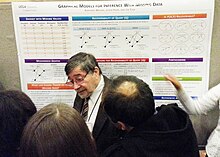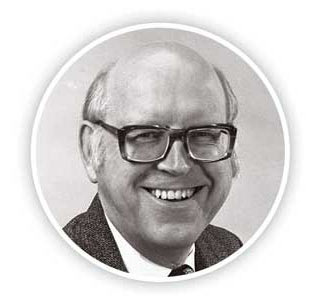
Allen Newell was an American researcher in computer science and cognitive psychology at the RAND Corporation and at Carnegie Mellon University's School of Computer Science, Tepper School of Business, and Department of Psychology. He contributed to the Information Processing Language (1956) and two of the earliest AI programs, the Logic Theorist (1956) and the General Problem Solver (1957). He was awarded the ACM's A.M. Turing Award along with Herbert A. Simon in 1975 for their contributions to artificial intelligence and the psychology of human cognition.
The Association for the Advancement of Artificial Intelligence (AAAI) is an international scientific society devoted to promote research in, and responsible use of, artificial intelligence. AAAI also aims to increase public understanding of artificial intelligence (AI), improve the teaching and training of AI practitioners, and provide guidance for research planners and funders concerning the importance and potential of current AI developments and future directions.
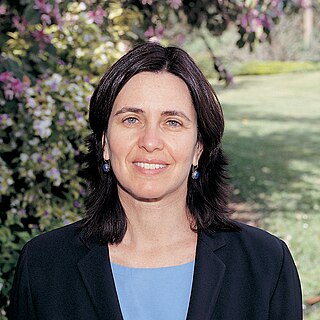
Shafrira Goldwasser is an Israeli-American computer scientist. A winner of the Turing Award in 2012, she is the RSA Professor of Electrical Engineering and Computer Science at the Massachusetts Institute of Technology; a professor of mathematical sciences at the Weizmann Institute of Science; the director of the Simons Institute for the Theory of Computing at the University of California, Berkeley; and co-founder and chief scientist of Duality Technologies.
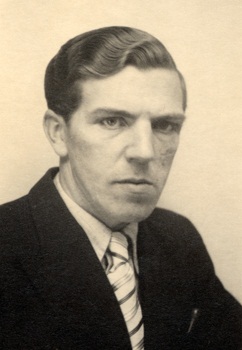
Trygve Magnus Haavelmo, born in Skedsmo, Norway, was an economist whose research interests centered on econometrics. He received the Nobel Memorial Prize in Economic Sciences in 1989.
Michael Irwin Jordan is an American scientist, professor at the University of California, Berkeley, research scientist at the Inria Paris, and researcher in machine learning, statistics, and artificial intelligence.

Daphne Koller is an Israeli-American computer scientist. She was a professor in the department of computer science at Stanford University and a MacArthur Foundation fellowship recipient. She is one of the founders of Coursera, an online education platform. Her general research area is artificial intelligence and its applications in the biomedical sciences. Koller was featured in a 2004 article by MIT Technology Review titled "10 Emerging Technologies That Will Change Your World" concerning the topic of Bayesian machine learning.
Vasant G. Honavar is an Indian-American computer scientist, and artificial intelligence, machine learning, big data, data science, causal inference, knowledge representation, bioinformatics and health informatics researcher and professor.
Saul Amarel was a professor of computer science at Rutgers University, and best known for his pioneering work in artificial intelligence (AI). He also had a career as a scientist, engineer, and teacher. He was a contributor to advanced computing and AI methodologies, both applied to scientific inquiry as well as engineering practice.
IEEE Intelligent Systems is a bimonthly peer-reviewed academic journal published by the IEEE Computer Society and sponsored by the Association for the Advancement of Artificial Intelligence (AAAI), British Computer Society (BCS), and European Association for Artificial Intelligence (EurAI).
Michael Paul Wellman is an American computer scientist and Lynn A. Conway Collegiate Professor of Computer Science and Engineering at the University of Michigan, Ann Arbor. He formerly led his department as Richard H. Orenstein Division Chair of Computer Science and Engineering.
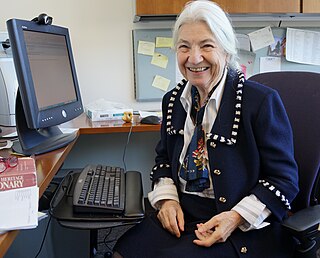
Ruzena Bajcsy is an American engineer and computer scientist who specializes in robotics. She is professor of electrical engineering and computer sciences at the University of California, Berkeley, where she is also director emerita of CITRIS.

Eric Joel Horvitz is an American computer scientist, and Technical Fellow at Microsoft, where he serves as the company's first Chief Scientific Officer. He was previously the director of Microsoft Research Labs, including research centers in Redmond, WA, Cambridge, MA, New York, NY, Montreal, Canada, Cambridge, UK, and Bangalore, India.
Lydia E. Kavraki is a Greek-American computer scientist, the Noah Harding Professor of Computer Science, a professor of bioengineering, electrical and computer engineering, and mechanical engineering at Rice University. She is also the director of the Ken Kennedy Institute at Rice University. She is known for her work on robotics/AI and bioinformatics/computational biology and in particular for the probabilistic roadmap method for robot motion planning and biomolecular configuration analysis.
In statistics, econometrics, epidemiology, genetics and related disciplines, causal graphs are probabilistic graphical models used to encode assumptions about the data-generating process.

Rina Dechter is a distinguished professor of computer science in the Donald Bren School of Information and Computer Sciences at the University of California, Irvine. Her research is on automated reasoning in artificial intelligence focusing on probabilistic and constraint-based reasoning. In 2013, she was elected a Fellow of the Association for Computing Machinery.
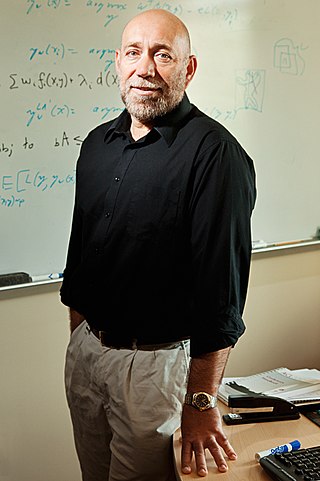
Dan Roth is the Eduardo D. Glandt Distinguished Professor of Computer and Information Science at the University of Pennsylvania and the Chief AI Scientist at Oracle. Until June 2024 Dan was a VP/Distinguished Scientist at AWS AI. In his role at AWS Roth led over the last three years the scientific effort behind the first-generation Generative AI products from AWS, including Titan Models, Amazon Q efforts, and Bedrock, from inception until they became generally available.
Yolanda Gil is a Spanish-born American computer scientist specializing in knowledge discovery and knowledge-rich intelligent user interfaces at the University of Southern California (USC). She served as president of the Association for the Advancement of Artificial Intelligence (AAAI), and chair of the Special Interest Group on Artificial Intelligence (SIGAI) for the Association for Computing Machinery (ACM). Gil was appointed to the National Science Board in 2024.

Thomas L. Dean is an American computer scientist known for his work in robot planning, probabilistic graphical models, and computational neuroscience. He was one of the first to introduce ideas from operations research and control theory to artificial intelligence. In particular, he introduced the idea of the anytime algorithm and was the first to apply the factored Markov decision process to robotics. He has authored several influential textbooks on artificial intelligence.
Causal AI is a technique in artificial intelligence that builds a causal model and can thereby make inferences using causality rather than just correlation. One practical use for causal AI is for organisations to explain decision-making and the causes for a decision.
